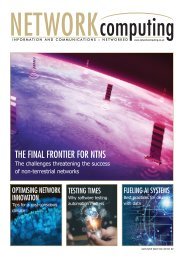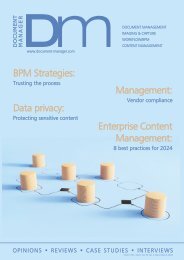CS Nov-Dec 2020
You also want an ePaper? Increase the reach of your titles
YUMPU automatically turns print PDFs into web optimized ePapers that Google loves.
threat intelligence<br />
APTS AND COVID-19<br />
A RECENT INTELLIGENCE REPORT REVEALS HOW ADVANCED<br />
PERSISTENT THREATS ARE USING THE CORONAVIRUS AS A LURE<br />
KHNP (Korea Hydro & Nuclear Power) cyber<br />
terrorism attacks of 2014.<br />
Since it first showed itself, Covid-19<br />
has had a catastrophic impact on our<br />
lives, turning into a global pandemic<br />
that has upended economies, livelihoods<br />
and hospital systems - almost all facets<br />
of everyday life has been touched. Such<br />
uncertainty and fear surrounding the<br />
virus and its impact represents a golden<br />
opportunity for threat actors to exploit the<br />
situation, as Malwarebytes points out in<br />
one of its latest Threat Intelligence Reports.<br />
"By using social engineering tactics such<br />
as spam and spear phishing campaigns,<br />
with Covid-19 as a lure, cybercriminals<br />
and threat actors increase the likelihood<br />
of successful attack. From late January on,<br />
several cybercriminal and state-sponsored<br />
groups have been doing just that, using<br />
coronavirus-themed phishing emails as<br />
their infection vector to gain a foothold<br />
on victim machines." In its white paper,<br />
Malwarebytes provides an overview of<br />
several APT groups using coronavirus as an<br />
enticement, as well as a description of their<br />
varied attack vectors, categorising the APT<br />
groups according to the technique they<br />
used to send spam or phishing emails:<br />
template injection, malicious macros, RTF<br />
exploits and malicious LNK files. Here, we<br />
look at just a few it singles out.<br />
TEMPLATE INJECTION<br />
Template injection refers to a technique in<br />
which threat actors embed a script moniker<br />
in the lure document - usually a Microsoft<br />
Office document - that contains a link to<br />
a malicious Office template via an XML<br />
setting. Upon opening the document, the<br />
remote template is dropped and executed.<br />
Kimsuky and Gamaredon are examples of<br />
APTs using template injection.<br />
Kimsuky (also known as Velvet Chollima)<br />
is a North Korean threat actor group active<br />
since 2013 and is known to be behind the<br />
Gamaredon, a Russian APT, primarily<br />
performs cyber espionage operations<br />
against Ukrainian military forces, as well<br />
as individuals related to the Ukrainian<br />
government. Gamaredon has been active<br />
since 2013 and often uses spear phishing<br />
as its initial infection vector.<br />
MALICIOUS MACROS<br />
Embedding malicious macros is the most<br />
popular method of infection used by APTs,<br />
warns Malwarebytes. In this attack vector,<br />
a macro is embedded in the lure document<br />
that will be activated upon its opening.<br />
APT36 is another threat group that has<br />
employed macro-embedded COVID-19<br />
themes in its recent campaigns. The group,<br />
believed to be Pakistani state-sponsored,<br />
mainly targets the defence, embassies and<br />
government of India. The primary targets<br />
of this APT are organisations related to<br />
diplomatic and government agencies in the<br />
UK, China, Japan, the Middle East, the US,<br />
Bangladesh, Sri Lanka and Pakistan.<br />
Hades is the APT group behind the attack<br />
against the Pyeongchang Winter Olympics.<br />
"Evidence suggests that this group is<br />
connected to the well-known Russian<br />
threat actor APT288," points out<br />
Malwarebytes. In their recent campaign,<br />
called Tricky Mouse, Hades targeted<br />
Ukrainian users using COVID-19 lures."<br />
The Malwarebytes Threat Intelligence<br />
team is "monitoring the threat landscape<br />
and paying particular attention to attacks<br />
trying to abuse the public's fear of the<br />
COVID-19 crisis".<br />
30<br />
computing security <strong>Nov</strong>/<strong>Dec</strong> <strong>2020</strong> @<strong>CS</strong>MagAndAwards www.computingsecurity.co.uk

















